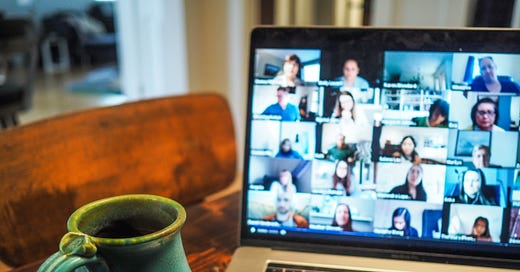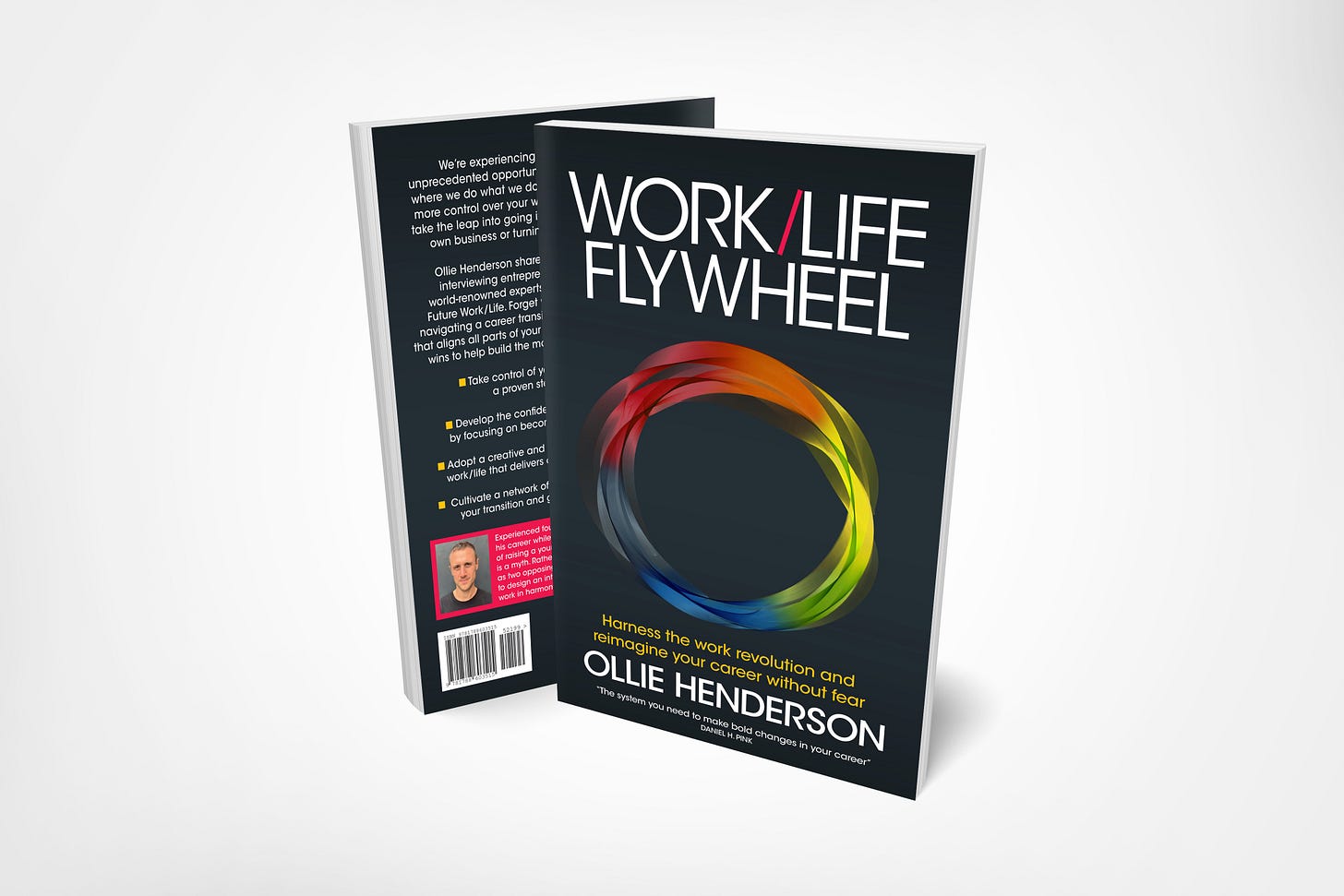Future Work/Life is my newsletter in which I explore ideas focused on the future of work and how to design legendary careers. Every week, I share something I’ve written, a few things I’ve enjoyed reading, and something great to listen to. If you find it interesting, please share it!
Exciting news! I’ve received advanced copies of my book and to celebrate, I’m sharing a sample of it with you today. After a fascinating conversation with Oyster CEO Tony Jamous on this week’s pod, I was reflecting on how the nature of teams is changing when I remembered I’d written something about that in Work/Life Flywheel! So, here’s a short extract from the chapter titled, ‘Connection and collaboration’…
The evolution of teams
After Stephanie Nadi Olson returned to work following the birth of her second daughter, she quickly realized she was back too soon.
As a successful advertising executive, she’d always been someone in a hurry. Still, after experiencing postpartum depression, she reflects on how she should have eased back into her high-pressure sales role more slowly. Even better would have been to redesign how she worked – perhaps partly in-person and partly remote. But this was 2015 when no one had even heard the expression hybrid work, and a request to do a couple of days at home was an admission that you didn’t take your job seriously.
Oh, how things have changed.
A year after her maternity leave ended and having to suck up working with a ‘nightmare boss’, she had the ‘“kick up the butt”’ she needed. She sat down with her husband, looked at their finances, and determined she had six months to figure out if the idea she’d had brewing was viable.
What was the business?
She was making a bet that she wasn’t the only one who needed more flexibility and independence in their work. Jump forward to 2022, and it’s fair to say she nailed that one:
People were saying, gosh, can I do a job share, can I go down on the number of hours that I work after I have a baby? Can I work remotely because I’m caring for a sick parent? And across the board in marketing, almost unequivocally, they were being told: no. They’re being told it’s impossible. And then Covid lifted the veil. All of the stuff that we’d been told was bullshit.
Stephanie’s business, We Are Rosie, was perfectly positioned to take advantage of several converging trends – increasing burnout among in-house marketing teams, higher demand for flexibility in the workforce, and advancements in technology allowing improved synchronous and asynchronous collaboration. Although we’re seeing a trend towards people going solo, We Are Rosie is an example that we still want to come together to achieve great things, but now we also want the freedom to choose when and with whom we do it.
After all, if you look at the data on engagement and satisfaction in the workplace, people will typically cite working in a team as the most fulfilling part of the job.
One of the beauties of controlling your pattern of work and having agency over which clients you work with is that you can gradually shape your work/life to your own desire. This is why more and more independent workers – whether small business owners, freelancers or contractors – are coming together in formal or informal collectives – whether in a liquid super team or through platforms like We Are Rosie. They create the communities we need in the absence of a full-time employer. And that matters.
As Stephanie told me:
We all learn from each other, and we try to be really open about how we’re feeling and how things are going, because honestly, building a business this quickly is no joke. We have been in the trenches together. We have been through some shit. We have done really hard things. We have cried on each other’s shoulders. We have celebrated incredible victories. And we have that sense of community.
Very soon into We Are Rosie’s journey, Stephanie recognized that however diverse the teams that were collaborating on client projects – in terms of location, background and skillset – they all shared a common goal – a mission to show the world that the model could work. They all had an incentive to demonstrate that this new way of working was sustainable and effective for clients, knowing that validating this allowed them to continue designing their perfect work/life – one which combined flexibility, ambition, and security.
They wanted to be able to do that forever because they love the autonomy and freedom and the creativity… but their fear was ‘I’m not going to have the next client, and then I’m going to have to go take a regular job. And I really don’t want to, but if I can’t fill my client pipeline, that’s going to be the end result.’ So, We Are Rosie shows up on the scene and says, we want to prove to the world that this way of working makes sense. And we want to fill your pipeline for you so that you can work in a way that makes sense for your life.
Leaping into solo and entrepreneurial life can seem scary, but communities can provide a bridge to the freedom and opportunities you’re searching for.
Joining an existing community can be a great way to build your confidence and get you started. The projects may provide a valuable additional revenue stream to grow your business. Or, as in the case of one ‘Rosie’ (as platform users are known), taking on some work allowed her to build the specific skills and knowledge to raise venture capital investment for her digital marketplace.
However you choose to nurture your community, you’ll find it brings you the chance to experiment and build new connections, and provides an incredible opportunity to keep learning.
Thanks for reading and if you’re interested in discovering more, you can pre-order the book here. Here’s what Professor Damian Hughes, host of The High Performance Podcast says about it:
“Ollie’s excellent book will show you the practical techniques of reimagining your life and career and reveals how much better things could be for you if you can adopt his hard-earned wisdom.”
You know how being gritty and persistent - never giving up - is a quality we’re told we should always admire? Well, there are times when you’d be better off doing the opposite - and quitting. How do you which is which? Listen to Annie Duke discuss it with Russ Roberts on EconTalk.
Here’s another good listen. This time with Derek Thompson, who explores why so many more people are spending more time alone. The podcast, “Why America is Suffering a ‘Friendship Recession’”, asks the question whether ‘aloneness’ is the same as loneliness.
Is mattering the key to well-being at work? Find out in this article from Quartz.
TLDR;
You can boost belonging and meaning among your peers when you take the time to swap and share.
How?
Work with your team to set up a recurring story hour, whether that’s a weekly wins circle, a regular lunch gathering, or a team-wide communication that lands in everyone’s inboxes.
And finally, I’ve been speaking a lot recently about the potential benefits of encouraging side projects among employees, so was interested to read this WorkLife article by Oliver Pickup. He writes about ‘Remote-working Gen Zers using would-be commutes to develop side hustles’.






